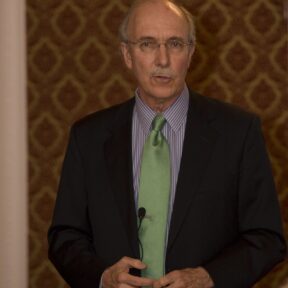
John Shattuck
: Photo from Creative Commons / Author of Photo: WeAreCEUOverview
* Former Vice Chairman of Amnesty International
* Former American Civil Liberties Union attorney
* Served in President Bill Clinton’s State Department
* Has taught at several colleges and universities
Born on September 22, 1943, John Shattuck earned a BA degree from Yale College in 1965, an MA from Clare College (Cambridge University) in 1967, and a JD from Yale Law School, where he served on the editorial board of the Yale Law Journal, in 1970. After completing his formal education, Shattuck worked as: a law clerk to Judge Edward Weinfeld of the U.S. District Court in the Southern District of New York (1970-71); National Staff Counsel at the American Civil Liberties Union (1971-76); a visiting lecturer at Princeton University’s Woodrow Wilson School of Politics (1972); Executive Director of the ACLU’s Washington office (1976-84); Vice President of Government, Community and Public Affairs at Harvard University (1984-93); Senior Associate for the Program on Science, Technology and Public Policy at the Kennedy School of Government (1986-93); Vice Chairman of Amnesty International USA (early 1990s); Assistant Secretary of State for Democracy, Human Rights and Labor (under President Bill Clinton, 1993-98); U.S. Ambassador to the Czech Republic (also under President Clinton, 1998-2000); CEO of the John F. Kennedy Library Foundation (2001-09); National Governing Board member with Common Cause (2003); Senior Fellow at Tufts University, where he taught international relations (2007-09); and President and Rector of Central European University (August 2009 through July 2016).
After stepping down from his post at Central European University (CEU) on July 31, 2016, Shattuck became President Emeritus of CEU on August 1. he then moved to Boston to become a professor of practice at the Fletcher School of Law and Diplomacy, and a senior fellow at the John F. Kennedy School of Government’s Carr Center for Human Rights Policy.
Strongly opposed to America’s involvement in the Iraq War, Shattuck said in a 2004 interview with UC Berkeley’s Institute of International Studies: “This has been a relatively unilateral intervention with the British at our side, with vast skepticism throughout the region and the world, and others not participating. Therefore, it is perceived as illegitimate, even though it could well have been justified as a humanitarian intervention had it been done differently.” In the same interview, he condemned the U.S. government’s post-9/11 anti-terrorism measures as unjustified assaults on civil liberties: “The fact that American citizens now can be designated by the Attorney General of the United States as enemy alien combatants and have the Bill of Rights stripped from them completely is an extraordinary assertion of executive power in the name of fighting terrorism.”
“We’ve had an erosion of international law,” Shattuck added in the UC Berkeley interview, “where we’ve seen the holding of thousands of prisoners in Guantanamo, and a claim that the Geneva Conventions in all their various ways don’t apply to those prisoners because these prisoners were not wearing uniforms on a field of battle and they’re not traditional combatants…. I think it shows a disregard for basic international human rights law in this period. Then we’ve had a substitution of a new doctrine of preemptive unilateral war for the old doctrine of multilateral humanitarian intervention, and that doctrine, of course, has been used in Iraq… [T]he way it was done has created a greater risk of conflicts and alienation within the region because it was done unilaterally. Finally, I think the United States has lost much of its soft power in this period. The soft power of projecting human rights and international law values has been lost…. [T]he way the war has been waged over the last two years has led to a serious erosion of human rights.”
Shattuck said it was America’s “duty” to take in even more Middle Eastern refugees than Europe. Lauding German Chancellor Angela Merkel for having accepted some 500,000 refugees into her country in 2015 alone, Shattuck urged the U.S. to follow Germany’s example. Without a much greater American effort to alleviate the “refugee crisis,” he elaborated, Europe’s unity would be destroyed by “far-right” anti-immigrant groups devoted to a toxic brand of “nationalism.” Asserting that anyone who opposed an increase in Muslim immigration to Europe was “racist,” Shattuck explained that a visit he had made to Auschwitz had sensitized him to attitudes of “intolerance” today.
In a December 2016 op-ed for the Boston Globe, Shattuck, implying that President-Elect Donald Trump was guilty of “treason,” wrote that while there was no evidence that Trump had ever possessed advanced knowledge of Russian efforts to hack the Democratic National Committee’s computer system, his dismissive attitude regarding claims of Russian hacking was troubling. “As president-elect,” wrote Shattuck, “he should have a strong interest in presenting a united front against Russia’s interference with the electoral process at the core of American democracy. By denigrating or seeking to prevent an investigation of the Russian cyberattack, Trump is giving aid or comfort to an enemy of the United States.”
In a July 2018 piece in The Boston Globe, Shattuck revisited the theme of treason: “The president’s hostility to the U.S. investigation of Russian cyberattacks, his failure to impose a cost on Russia for the attacks, his denigration of U.S. alliances, and his eagerness to have ‘an extraordinary relationship’ with the Russian leader [Vladimir Putin] all point toward giving aid and comfort to an enemy.”
In addition to his aforementioned activities, Shattuck also has served as a Senior Fellow at the American Academy of Arts and Sciences, a member of the Council on Foreign Relations, and Advisory Board Chairman with Brandeis University’s Center on Ethics, Justice and Public Life.
Further Reading: “John Shattuck” (Harvard.edu, People.ceu.edu); John Shattuck Interview (UC Berkeley’s Institute of International Studies, 2004, see pages 5 &6); “John Shattuck and America’s ‘Duty’ to Solve Europe’s Refugee Crisis” (by Hugh Fitzgerald, 5-5-2016); “Donald Trump Raises Specter of Treason” (by John Shattuck, Boston Globe, 12-16-2016); “Is Donald Trump Committing Treason?” (by John Shattuck, Boston Globe, 7-16-2018).